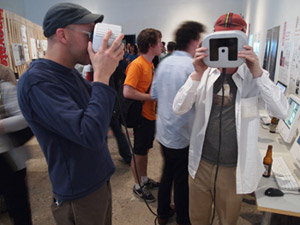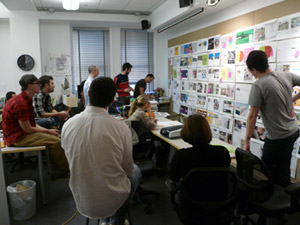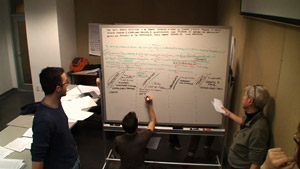Neil Kleinman, senior fellow at the Corzo Center for the Creative Economy and professor of media and communication – The University of the Arts.
1. When did you start out in this business and how?
My “business” is education but I’ve been in publishing, in law, in economic development, and in a range of areas connected to thinking about how we change the world. (Yes, I grew up in the 50s and 60s and saw the power of people to rethink the ways things are done.)
I “published” my first newspaper when I was in the 6th grade, once wrote and published a newspaper in Latin, edited a college newspaper, started an underground newspaper in the 60s, and later worked in Boston and NY publishing. I helped to create a residential theater and experimental press. In the 70s and then later in the 80s, I started grad programs that linked design, writing, business, and technology in the 70s. I have a PhD in English from UConn and a degree in law from UPenn. I’ve been a teacher, senior college/university administrator, writer, and… camp counselor.
You could say I’ve been around.
2. Did you set out to do this or did it just happen? Tell us about that.
The Corzo Center for the Creative Economy has been an idea that has been kicking around for eight or more years. Around 2002 or 2003, a number of us here in Philly in the “creative community” thought that creatives – across the spectrum of media, design, and arts – weren’t getting the recognition they deserved and were leaving town to get it elsewhere. We also came to believe that, with a changing economy, creatives of all types need to begin to understand the economic value of what they produced.

Interaction with Devices
Like any “good” idea, it didn’t die. The idea lay in the streets until it was adopted by the University of the Arts.
When I stepped down as dean of the College of Media and Communication/UArts, I was asked to organize the Corzo Center. Since it was an idea I cared about – something I thought was very important to the community and the students I teach – I couldn’t say “no.” How could I ask someone else to do it if I wouldn’t do it?
3. What were and are the main motivators/influences on you and why?
I am pained by the fact that we’re educating remarkably talented people who don’t have control over their economic futures. It’s not enough to give people a great education in their art without making it possible for them to make a living doing it. To depend upon the kindness of strangers in this economy is to lean against a wall that will collapse. We need to show our students that what they learn empowers them to change the world – to be great artists and media makers at the same time they can become active citizens and economically self-sufficient.
I am equally pained that Philadelphia isn’t living up to its past and its promise. It is a city with a great history and great (potential) future. But we spend too much time pointing back at what we have done, rather than forward at what we will do. I don’t want to live in a city that doesn’t have the excitement of possibility. We are, though, at the tipping point, and the creative economy – the ability to link imagination and ideas to innovation and new ways of making urban life rich – is going to be the engine, I think, that is going to make this city a place of leadership and innovation.
4. What experience did you learn the most from?

VizThink Studio Wall
My failures are too many to count. I have started new programs intended to attract students to a new college and no one came. I have tried to persuade educators, lawyers, publishers, and business leaders that the then new media was going to transform the nature of law, art, education, and business, but they laughed. They were all good ideas with lots of truth… I thought then and think now. But they failed. Why?
I didn’t understand my audience and I didn’t understand how hard it is to change human behavior. We are all like frogs. If you put us into boiling water, we’ll jump out. We’ve got to find ways to make change slowly but persistently so we can get used to it. The changes I’ve seen that work best are those that have a persistent push and energy behind them, punctuated with sparks of inspiration, humor, and humility.
5. What projects stand out for you because they were unusual, challenging or fun?
They are all projects that involved changed behavior, changed abilities, and connecting people and skills that didn’t normally connect. Some examples: A program I had helped create graduated designers who were accomplished writers and writers who were accomplished designers. A laboratory that brought non-techies together to learn how to use a then new technology – desktop publishing – to see them use it to write and design. A residential theater in the middle of no where that produced new plays, experimental plays, published poetry, produced electronic music – and we not only survived we prospered.
6. What would we be surprised to know about you?
Although I am tone deaf, I have played the piano and the clarinet and sing to the considerable discomfort of all. And I drink three extra large coffees a day.
7. With constantly and rapidly evolving technology, how do you stay current?
Now a-days, I watch more than I do. But I’m a good watcher. I like, especially, to watch those in their 20s and 30s. Talking with them is like visiting a foreign country – listening to a language I’ve never heard when I see what they are up to. A bit frightening but exciting too.
8. What do you think is the future for ______ in Philly?
I’ll leave the blank in that question blank. The future on a full range of areas – creativity, innovation, new technology and media, art and music, and civic engagement – is what we make it and we can do creative things if we don’t let others tell us we can’t do it and if we don’t let the limits of energy and resources depress us too much.
I’m eager to see what we’re like in 20 years. If we’re not as good as a great city deserves, it will be our fault… individually and collectively.
9. Tell me about what you do.
I teach. I write. I organize. I persuade. I think. I talk. I help. I remember and I hope.
The Corzo Center supports artists and media makers to give them the economic savvy they’ll need to take advantage of their talents as well as provide mentors and limited funding to those with new business ideas.

Whiteboard Working Session
The Center offers workshops, short courses, and lectures, supports a creative incubator, funds new business ideas growing out of the arts and media, offers mentors and advisors, and has open office hours so that artists and media makers can talk through their problems with lawyers, accountants, and marketing, social media, and business strategists. This year, we are launching a funding source for early-stage ideas, called Corzo Create! And we partner with a number of local groups in the arts and entrepreneurship, providing space and support.
Except for a Saturday Workshop, the Creative Incubator funded by Wells Fargo Bank, and Corzo Create!, all of Corzo programs are free and open to the public.
10. How did you get to where you are today?
Showing up. Getting beyond my anxiety about failing. Trying again. And being inordinately curious. Why are things the way they are? Why can’t we change them? What connects this with that?
11. Which projects or experiences in your career stand out, and why?
Career and Life – hard to tell the difference. Seeing my students become better than I am. Helping to build things that last after I’ve left. But, also, being married, having a daughter and watching her grow up.
12. What have you learned along the way?
Making a living and making a life can be the same thing. Showing up especially after a failure is always important. No one is going to be your cheerleader (except perhaps your family) so don’t count on it. Do “it” because it’s what you need to do.
13. What advice do you have for others in your field, and for the Philly creative community in general?
Plan for the worst. Hope for the best. Work until you’re happy with what you’ve accomplished.
14. What do you do in your spare time?
Walk, read, go to movies, look, and talk.
15. Do you have an unrealized goal or aspiration?
To learn Spanish, relearn Latin, write a book preparing young people for creating and making a living in the new economy, start a blog.
16. Who do you admire the most?
W. H. Auden, Leonardo Da Vinci, Ben Franklin, and Bob Dylan. I can’t tell them apart.
17. If you weren’t doing this, what would you be doing?
I’d be an archeologist or a paleontologist. I like digging in the past.

